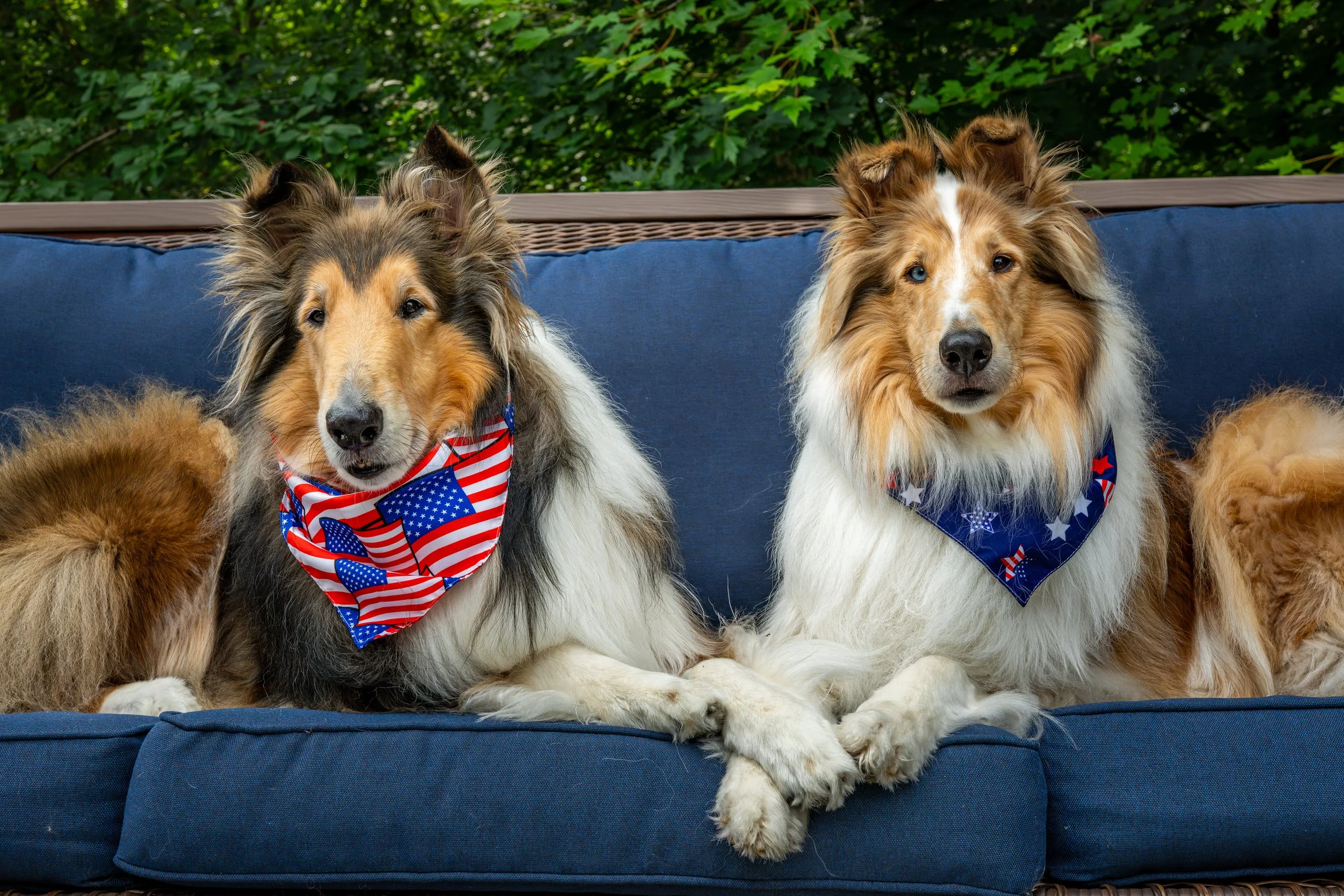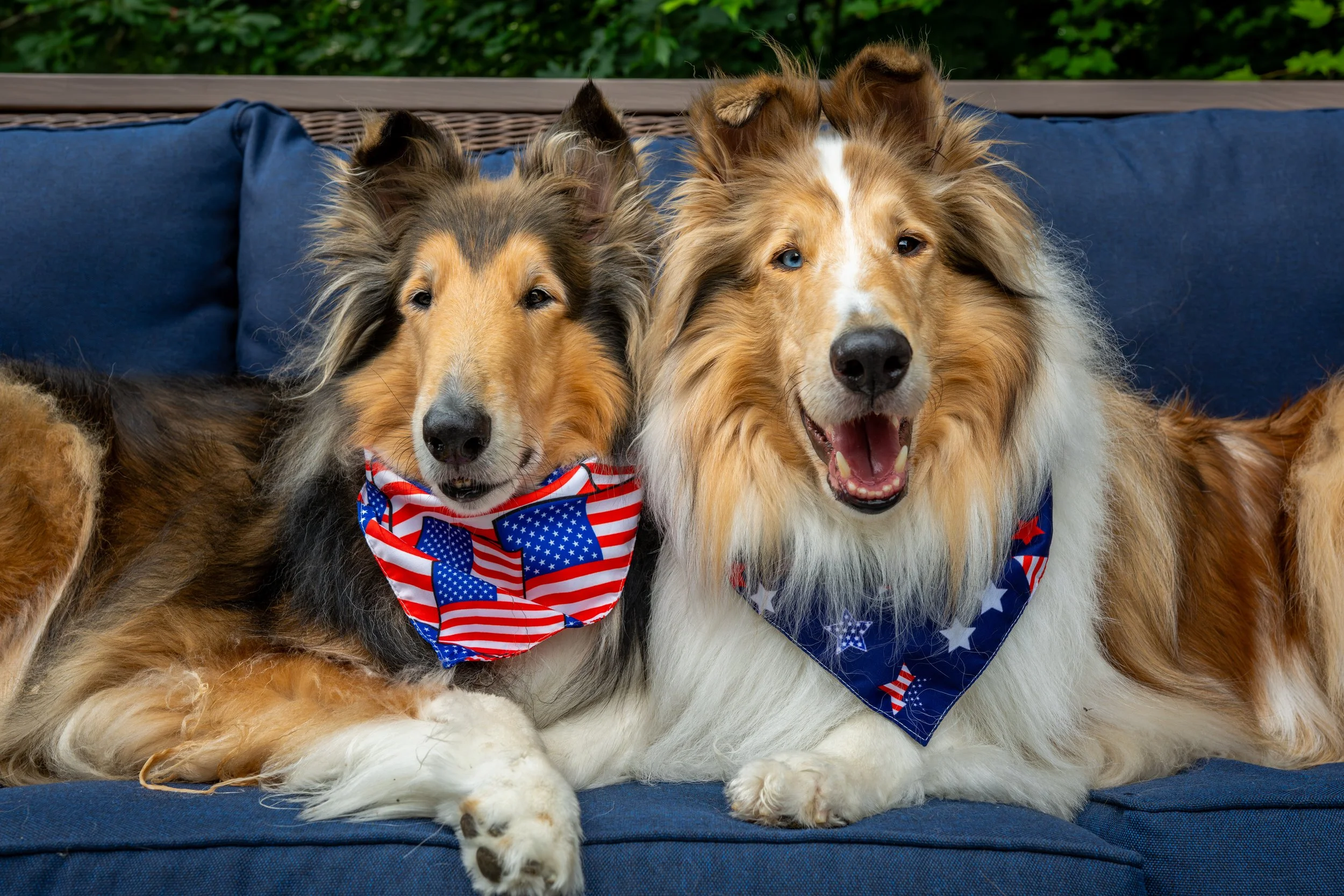Tips for a Safe & Stress-Free Fourth of July for Your Pet
As a pet photographer, I'm all about capturing happy moments. The Fourth of July should be a celebration, but for our furry friends, the fireworks can be anything but fun. The good news is that with a little planning, you can make the holiday a safe, calm, and comfortable experience for your pet. Here’s a quick checklist to help you and your best friend enjoy a stress-free Fourth!
1. Update Their ID: Your Pet's Ticket Home
Image Credit: Jamie Street @jamie452
According to the American Animal Hospital Association (AAHA), more pets go missing around the Fourth of July than any other time of year, as the scary sounds can cause them to panic and run. Think of proper identification as their ultimate safety net.
Check the Tag: Make sure your pet’s collar has an ID tag with your current phone number that is easy to read, a tip emphasized by pet safety advocates like Petreleaf.
Check the Chip: A microchip is a fantastic backup, but as the AAHA points out, it only works if the information is up to date. You can use the AAHA Universal Pet Microchip Lookup tool online to see which registry your pet's chip is with, then visit that company's site to confirm your contact details are correct.
2. Create a Cozy "Safe Haven"
When things get loud, pets instinctively look for a safe place to hide. You can help by creating the ultimate comfort zone for them.
Location is Key: As suggested by organizations like Humane Animal Partners, choose a quiet, interior room like a basement, walk-in closet, or bathroom where outside noises are muffled.
Make it Comfy: The wellness experts at Calm.com advise filling the space with their favorite bed, soft blankets, and an unwashed t-shirt that smells like you for extra comfort. If you use a crate, cover it with heavy blankets to block sound and light, but as they and other experts warn, always leave the door open so they don't feel trapped.
3. Plan a Pre-Fireworks Workout
A tired pet is a more relaxed pet. Plan a fun-filled day to tucker them out before the evening's festivities begin.
Get Moving: As recommended by Petmd, a long hike, a vigorous game of fetch, or a fun run early in the day can do wonders to physically and mentally exhaust your dog.
Timing is Everything: Make sure this fun happens well before sunset, so your pet is ready for a good snooze when the fireworks start.
4. Muffle the Mayhem with Sound
You can help drown out the scary booms from outside by creating a consistent, calming soundscape inside.
Turn Up the White Noise: The American Kennel Club (AKC) suggests a loud box fan, an air conditioner, or a white noise machine can help mask the sharp sounds of fireworks.
Play Calming Music: Some experts, like those at pet food company Bella & Duke, suggest that classical music or even reggae can have a calming effect on pets.
5. Keep Them Securely Indoors
The American Veterinary Medical Association (AVMA) stresses that the absolute safest place for your pet during fireworks is inside with you.
Lock It Down: Close all windows, doors, and even doggy doors to prevent a potential escape. As groups like Humane Animal Partners recommend, drawing the curtains or blinds can also help block the startling flashes of light.
Leash Up for Potty Breaks: Take care of any final bathroom business well before dark. When you do go out, the AKC advises keeping your pet on a leash, even in a fenced yard. An unexpected firework could cause them to bolt.
6. Watch Out for Dangerous BBQ Foods
It's tempting to share your holiday feast, but as the ASPCA warns, many popular cookout foods are toxic to pets.
Toxic Treats: The ASPCA lists onions, garlic, grapes, raisins, chocolate, and anything containing alcohol or the artificial sweetener xylitol as foods to keep away from pets.
Other Hazards: The American Kennel Club adds that cooked bones can splinter and cause serious injury, corn on the cob can cause intestinal blockages, and very fatty or salty foods can lead to painful pancreatitis.
Image Credit: Evan Wise @evanthewise
7. Be Their Calm Anchor
Your pet looks to you for cues on how to feel. Your calm demeanor can make a world of difference.
Stay Cool: If you're calm, your pet is more likely to feel that everything is okay, a point made by groups like Humane Animal Partners.
Offer Comfort: It's a myth that you'll reinforce fear by comforting your pet. As Dr. Tammie King tells Calm.com, "You cannot reinforce an emotion." If they come to you for reassurance, the AKC suggests offering it with slow, gentle pets and a soothing voice.
8. Know When to Ask for Help
For some pets, a little extra support is needed, and there are great options available.
Calming Aids: For mild anxiety, Humane Animal Partners suggests products like a pressure vest (such as a ThunderShirt) or a dog-appeasing pheromone (DAP) diffuser can help some pets feel more secure.
Veterinary Support: If your pet's fear is severe, don't hesitate to talk to your veterinarian well in advance of the holiday. Experts at Vetmed UC Davis note that vets can prescribe safe and effective anti-anxiety medications that can help your pet rest peacefully through the noise.
Wishing you and your furry family a safe, happy, and picture-perfect Fourth of July!





